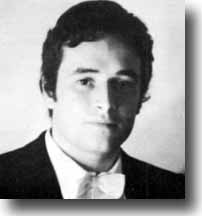José Carreras
Erika Davidson, Opera News, December 1972

When José Carreras, the Catalan tenor, returns to New York for a third visit--his Carnegie Hall debut in I Lombardi, December 7-- he comes as a young singer on the brink of stardom. He might not be aware of it, because he is an open, uncomplicated man, too intelligent for eccentricities. When he arrived in New York for the first time, there was no fanfare--just a recommendation by his compatriot Montserrat Caballé and her brother Carlos, an agent, which led to a performance at the City Opera in Madama Butterfly last March, noted by the Times as a "solid debut." The second time around he came here via a Hollywood Bowl concert of Rigoletto (September), under James Levine, where he was welcomed as a "distinct discovery." Then, within three weeks and three leads at the City Opera, Carreras took New York's operatic scene by storm: his Alfredo "immediately won the audience's heart," his Rodolfo was proclaimed "superb," and after his Edgardo he was hailed by the Times as "the company's finest tenor for the Italian repertory."
The handsome Spaniard with the boyish looks and quick smile says simply that this sudden recognition gave him "confidence and the perseverance to build a reputation carefully." While enjoying his City Opera successes he was rehearsing for a single performance of Rossini's Pietra del Paragone with Clarion Concerts at Alice Tully Hall, which is also to be his first recording, for Vanguard.
Carreras seems to have an unusual taste for hard work. Even on a performance day in New York he rehearsed up to four hours, admitting that it tired him a bit. Staying with his pretty wife, Mercedes, in a Central Park West hotel close to Lincoln Center, he did little sightseeing but was determined to discover New York with his camera next time around. On this trip, study took priority. "Of course, I'm familiar with the historical and period background of the operas, but I do no particular research. I feel the composer said everything in the music. At this point I'm trying to improve technique and expression, which must be concentrated in the voice. I like plenty of stage rehearsals, since I don't have much experience yet. I made my debut not quite three years ago"--as Ismaele in Nabucco, in Barcelona.
For so young a tenor, the question of models inevitably came up, and Carreras admitted he loves to listen to records--"not to imitate, just to luxuriate in beautiful singing. I greatly admire Bjoerling, who was such a complete artist. Being Latin myself, though, I feel instinctively drawn to the passionate expression of Di Stefano."
Carreras was also preparing his first Maurizio in Adriana Lecouvreur (for the Liceo in Barcelona during November), a role he eagerly anticipated, especially since he would be singing with Miss Caballé. The soprano likes her young leading man, having sung with him in Lucrezia Borgia and Luisa Miller in Barcelona, Maria Stuarda in London and Paris. Then came Caterina Cornaro, the unknown Donizetti opera presented last summer in London's Festival Hall. When another Catalan tenor, Giacomo Aragall, suddenly fell ill at the last moment, Miss Caballé asked for Carreras. "Two days and one night to learn a role I didn't know! I'll never forget it--the opera or the occasion. Everybody was very helpful, but I hope this doesn't happen often."
Carreras, born on December 5, 1946, in Barcelona, where his father owns a small chemical plant, showed early inclination to study music. He began his lessons in piano and solfeggio at age eight; he had just seen his first opera at the Liceo, Aida, and because of his enthusiasm his parents bought him and his brother a subscription. At seventeen he pursued voice studies with Jaime Francisco Puig of Barcelona but agreed, considering the family business, to study chemistry for three years. He still likes to play around his father's laboratory now and then. He also enjoys tennis, which keeps him physically fit.
The tenor met his wife, a student of economics science and also born in Barcelona, while attending a performance at the Liceo--La Forza del Destino, a prophetic beginning of a five-year courtship. Then one day when he was singing in Paris April 1971 he suddenly telephoned his fiancée, "Let's get married when I return." In a week's time Mercedes made all the arrangements, and they became man and wife in Barcelona's beautiful cathedral. Now they happily await their first "bambino," who has announced himself for February. Fatherhood: another career for Carreras."
This page was last updated on: May 17, 2005